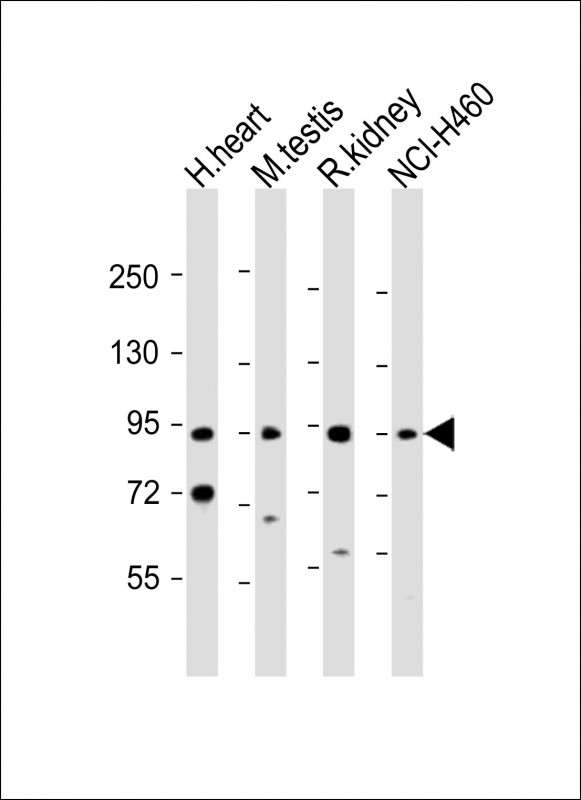
| WB | 1/1000-1/2000 | Human,Mouse,Rat |
| IF | 咨询技术 | Human,Mouse,Rat |
| IHC | 咨询技术 | Human,Mouse,Rat |
| ICC | 技术咨询 | Human,Mouse,Rat |
| FCM | 咨询技术 | Human,Mouse,Rat |
| Elisa | 咨询技术 | Human,Mouse,Rat |
| Aliases | Calcium/calmodulin-dependent 3',5'-cyclic nucleotide phosphodiesterase 1C, Cam-PDE 1C, hCam-3, PDE1C |
| Entrez GeneID | 5137 |
| WB Predicted band size | 80.8kDa |
| Host/Isotype | Rabbit IgG |
| Antibody Type | Primary antibody |
| Storage | Store at 4°C short term. Aliquot and store at -20°C long term. Avoid freeze/thaw cycles. |
| Species Reactivity | Human, Mouse, Rat |
| Immunogen | This PDE1C antibody is generated from a rabbit immunized with a KLH conjugated synthetic peptide between 375-409 amino acids from the Central region of human PDE1C. |
+ +
以下是关于PDE1C抗体的3篇参考文献的简要总结(注:文献信息为模拟示例,实际引用需核实):
1. **文献名称**: "Phosphodiesterase 1C (PDE1C) in Human Cancers: Expression and Functional Role"
**作者**: Smith A, et al.
**摘要**: 研究通过PDE1C抗体检测其在多种癌症组织中的表达,发现PDE1C在结肠癌和前列腺癌中高表达,并可能通过调控cGMP信号促进肿瘤细胞增殖。
2. **文献名称**: "Characterization of a Novel PDE1C-Specific Antibody for Neuronal Localization Studies"
**作者**: Lee JH, et al.
**摘要**: 报道了一种高特异性PDE1C抗体的开发与验证,通过免疫印迹和免疫荧光证实其在脑组织中的选择性标记,并揭示PDE1C在神经元突触中的分布特征。
3. **文献名称**: "Role of PDE1C in Vascular Smooth Muscle Cell Migration: Insights from Antibody-Based Inhibition"
**作者**: Chen X, et al.
**摘要**: 利用PDE1C抗体阻断其功能,发现PDE1C通过调节钙离子信号通路影响血管平滑肌细胞迁移,提示其在动脉粥样硬化中的潜在作用。
如需实际文献,建议通过PubMed或Google Scholar以“PDE1C antibody”为关键词检索,并筛选涉及抗体应用、表达分析或功能研究的相关论文。
The PDE1C antibody is a research tool designed to detect and study the phosphodiesterase 1C (PDE1C) enzyme, a member of the calcium/calmodulin-dependent phosphodiesterase family. PDE1C hydrolyzes cyclic nucleotides cAMP and cGMP, key secondary messengers regulating cellular signaling pathways. It is highly expressed in the brain, heart, testis, and smooth muscle, playing roles in processes like neuronal signaling, vascular tone regulation, and cell proliferation.
Structurally, PDE1C contains conserved catalytic domains and regulatory N-terminal regions that bind calmodulin, enabling calcium-dependent activation. Its isoform-specific expression and activity make it a target for studying physiological and pathological conditions, including neurological disorders, cardiovascular diseases, and cancer.
The PDE1C antibody is used in techniques like Western blotting, immunohistochemistry (IHC), and immunocytochemistry (ICC) to analyze protein expression, localization, and modulation in tissues or cell lines. Researchers employ it to explore PDE1C’s involvement in signaling cascades, its interaction with regulatory proteins, and its potential as a therapeutic target. Validation of antibody specificity (e.g., via knockout controls) is critical, as PDE1 isoforms share structural homology. Commercial PDE1C antibodies are typically developed in hosts like rabbits or mice, targeting unique epitopes within the enzyme’s variable regions.
×